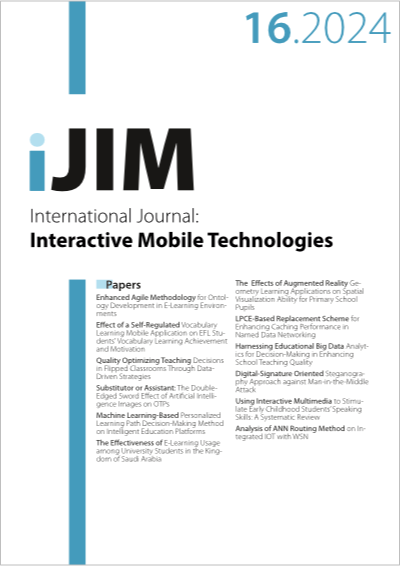Effect of a Self-Regulated Vocabulary Learning Mobile Application on EFL Students' Vocabulary Learning Achievement and Motivation
DOI:
https://doi.org/10.3991/ijim.v18i16.49755Keywords:
Multimedia and virtual environments, mobile technologies, mobile learning applications, interactive mobile technology, self-regulated learning, vocabulary learning, learning achievement, learning motivationAbstract
The purpose of this study was to develop and evaluate the effectiveness of a self-regulated vocabulary learning mobile application (SRVL-MAPP) to improve English as a foreign language (EFL) students’ English vocabulary learning achievement and motivation. To evaluate the effectiveness of SRVL-MAPP, an experiment was conducted with 60 fourth-grade students from a primary school in Henan Province, China. These students were divided into two classes and randomly assigned to either the experimental group, which used SRVL-MAPP, or the control group, which used a mobile vocabulary learning application (NSRVL-MAPP) without the SRL mechanism, with 30 students in each group. The experiment lasted for three weeks. The results revealed that students in the experimental group outperformed those in the control group in both vocabularies learning achievement and motivation. In addition, the results also indicated that SRVL-MAPP significantly improved the English vocabulary learning achievement and motivation of field-dependent learners, while no such effect was observed for field-independent learners.
Downloads
Published
How to Cite
Issue
Section
License
Copyright (c) 2024 Chuang Chen, Nurullizam Jamiat, Shaoxu Du

This work is licensed under a Creative Commons Attribution 4.0 International License.



